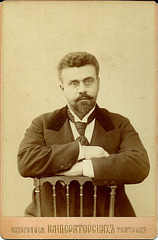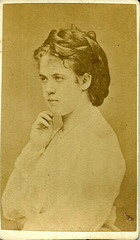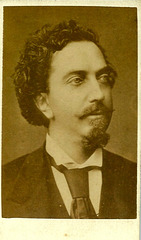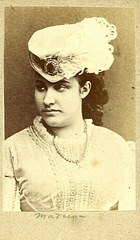OperaMania's photos
Eugenia Mravina by Photography of Imperial Theatre…
| |
|
EUGENIA MRAVINA
( Yevgeniya Konstantinova Mravinskaya)
(10 February 1864-24 October 1914)
Russian Soprano
Born St Petersburg studied at Conservatory St Petersburg with Pryanishnikov and in Berlin with Desiree Artot went to Paris to study with Mathilde Marchesi . Debut 1885 as Gilda in 'Rigoletto" at Vittorio Veneto , Was a principal at the Marinsky St Petersburg from 1886-1887 . Toured extensively throughout Russia . Farewell concert in 1906 at St Petersburg. roles included Lydmila in " Russlan & Lydmilla" , Tatyana in "Eugene Onegin" ,
Hjalmar Frey by Photography of Imperial Theatres i…
| |
|
HJALMAR FREY
(Johann Hjalmar Frey)
(28 November 1856-1 Jnauary 1913)
Finnish Bass Baritone
He studied singing in Milan under Francesco Lamperti and Silvia della Valle and continued his study in Vienna and Leipzig . In 1880 he made his debut at the Opera House of Trieste. Appeared at the Rom Apollo Theatre 1881-1882 as a soloist singing with the russian choir. On 22. 3. 1882 he appeared in the premiere of G. Donizetti’s opera ‘’Il Duca d'Alba’’. From 1884 to 1885 he perfected his vocal technique under R. Müller in Leipzig and then became a member of the Court Opera of St. Petersburg, singing here till 1905. At the St. Petersburg Court Opera he performed in the premieres of two important operas by P. Tshaikovsky: on 19. 10. 1890 in "The Queen of Spades", on 18. 12. 1892 in ‘’Iolanta’’. Later he lived in Helsinki. There he was active since 1909 as a choirmaster of the church of the Swedish Lutheran municipality.
Kladvilla Tugarinova by Photography of Imperial Th…
| |
|
KLAVDILLA TUGARINOVA
Russian Contralto
1877-19??
Russian mezzo soprano/contralto Her career seems to have been strictly local , she does not appear to have performed outside Russia.At the Marinsky 1902-1917 she appeared as Vanya " :ife of the Tsar" , Seibel , Feodor in "Boris Goudonov ,Olga "Eugene Onegin " < Countess " Queen of Spades " among many . After the revolution she remained in Russia and performed for several more years , In her retirement she taught singing in Stalingrad ,
Maria Dolina Gorlenko by Photography of Imperial T…
| |
|
MARIA DOLINA GORLENKO
(Maria Ivanovna Sajuschkina Gorlenko)
Russian Contralto
1868-1919
Studied with Kondratiev. Final studies were carried out with Carelli in Naples, with Mastriani in Milan and finally in Paris. In 1886 she made her debut at the Marienskij Theatre in St. Petersburg as Vanya in Glinka's "A life for the Tsar" (Ivan Susanin).Creator of Borodin's "Prince Igor" (Kontschakowna) & Tchaikowsky's "Pique Dame" Old Countess. She toured the great opera centers of Europe unlike many of her contemporaries. In 1886. she made her debut at the Mariinsky Theater in the "Life for the Tsar", which later became her crown role. Roles included (The Snow Maiden ") and Grunya (Jц¦chymov force"). introduced in concerts around Europe Russian folk music and art.
Maria Dolina Gorlenko by Photography of Imperial T…
| |
|
Maria Dolina Gorlenko as Vanya "Ivan Susanin" Glinka
MARIA DOLINA GORLENKO
(Maria Ivanovna Sajuschkina Gorlenko)
Russian Contralto
1868-1919
Studied with Kondratiev. Final studies were carried out with Carelli in Naples, with Mastriani in Milan and finally in Paris. In 1886 she made her debut at the Marienskij Theatre in St. Petersburg as Vanya in Glinka's "A life for the Tsar" (Ivan Susanin).Creator of Borodin's "Prince Igor" (Kontschakowna) & Tchaikowsky's "Pique Dame" Old Countess. She toured the great opera centers of Europe unlike many of her contemporaries. In 1886. she made her debut at the Mariinsky Theater in the "Life for the Tsar", which later became her crown role. Roles included (The Snow Maiden ") and Grunya (Jц¦chymov force"). introduced in concerts around Europe Russian folk music and art.
Joachim Tartakov by Photography of Imperial Theatr…
| |
|
Joachim Tartakov
1860-1923
Russian Baritone
Studied St Petersburg Conservatory with Camille Everard. Graduated from the Conservatory in 1881 and joined the Odessa Opera Company as first baritone that same year. There he made his debut in 1882 as Rigoletto in "Rigoletto" by Verdi’s. Then from 1882 he sang in provincial opera houses. and travelled to Italy for 2 seasons.Upon his return he was engaged at the Marinsky Theatreas principal baritone .He also sang in Berlin, Copenhagen, and other European cities. He performed Tchaikovsky’s art songs in concert. .From 1900 he was the Director of the Marinsky and 1920 to 1923 he was a professor at the Petrograd Conservatory. His roles included Rigoletto in "Rigoletto" by Verdi , Tonio in "I Pagliacci" by Leoncavallo ,Germont in "La Traviatta" by Verdi , Onegin in "Eugene Onegin" by Tchaikovsky , Demon in "Demon" by Rubinstein and many others
Leonid Yakovlev by Photography of Imperial Theatre…
| |
|
As Saint Bris in "Les Huguenots" by Meyerbeer
LEONARD YAKOVLEV
Russian Baritone
1858-1919
Heard by Tchaikovsky and recommended to the director of the Marinsky Theatre at St Petersburg . Debut at the Marinsky Theatre in 1887 as "Faust" . Created Yeletsky "Queen of Spades" and the Demon in Rubinsteins 'Demon". Important singer at the Marinsky until vocal problems forced his retirement
Leonid Yakovlev by Photography of Imperial Theatre…
| |
|
Leonid Yakovlev as Escamillo 'Carmen" Bizet
LEONARD YAKOVLEV
Russian Baritone
1858-1919
Heard by Tchaikovsky and recommended to the director of the Marinsky Theatre at St Petersburg . Debut at the Marinsky Theatre in 1887 as "Faust" . Created Yeletsky "Queen of Spades" and the Demon in Rubinsteins 'Demon". Important singer at the Marinsky until vocal problems forced his retirement
Leonid Yakovlev by Photography of Imperial Theatre…
| |
|
LEONARD YAKOVLEV
Russian Baritone
1858-1919
Heard by Tchaikovsky and recommended to the director of the Marinsky Theatre at St Petersburg . Debut at the Marinsky Theatre in 1887 as "Faust" . Created Yeletsky "Queen of Spades" and the Demon in Rubinsteins 'Demon". Important singer at the Marinsky until vocal problems forced his retirement
Feodor Chaliapin By Photography of Imperial Theatr…
| |
|
Chaliapin as Mephistopheles "Faust" 1895
FEODOR IVANOVICH CHALIAPIN
(February 13 ,1873 – April 12, 1938)
Russian Bass
Largely self-taught, he began his career at Tbilisi and the Imperial Opera, St. Petersburg in 1894. He was then invited to sing at the Mamontov Private Opera (1896–1899); his first role there was as Mephistopheles in Gounod's Faust,
At Mamontov he also met Sergei Rachmaninoff, who was serving as an assistant conductor there and with whom he remained friends for life. Rachmaninoff taught him much about musicianship, including how to analyze a music score, and insisted that Chaliapin learn not only his own roles but also all the other roles in the operas in which he was slated to appear. With Rachmaninoff he learned the title role of Mussorgsky's Boris Godunov, which became his signature character , On the strength of his Mamontov appearances, the Bolshoi Theatre in Moscow engaged Chaliapin, where he appeared regularly from 1899 until 1914. During the First World War, Chaliapin also appeared regularly at the Zimin Private Opera in Moscow. In addition, from 1901, Chaliapin began touring in the West, making a sensational debut at La Scala that year as the devil in a production of Boito's Mefistofele, under the baton of one of the 20th century's most dynamic opera conductors, Arturo Toscanini
Chaliapin's last stage performance took place at the Monte Carlo Opera in 1937, as Boris. He died the following year of leukemia, aged 65, in Paris, where he was interred
Bertha Ehnn By Unknown
| |
|
BERTHA EHNN
(1847-1932)
Austrian Soprano
Studied at the Vienna Conservatory as a student of Marie Andriessen of Lingke
Debut in 1864 in Linz (Danube) as Nancy in Flotow's 'Martha' and as Irene in 'Belisario' by Donizetti . In 1864-65 she was engaged at the Theater of Graz. In 1865 she was at the Court Theatre of Hanover and also at the Municipal Theatre of Nuremberg. In 1865 she created for Nuremberg Selika in the local premiere of Meyerbeer's "Africaine '. 1866 she performed at the Court Theatre of Darmstadt as Marguerite in 'Faust' by Gounod, as Agathe in the 'Freischütz' and again as Selika; . 1866-68 she was a member of the Stuttgart Court Opera.
Highlights in her stage repertoire included roles such as Cherubino and later the Countess in 'The Marriage of Figaro', Pamina in the Magic Flute, Agathe in the 'Freischütz', the title character in 'Euryanthe' by Weber, the Orsini in 'Lucrezia Borgia' by Donizetti, Leonore in 'La Favorita' by the same composer, Rachel in La Juive 'of Halévy and the Giulia in' I Capuleti ed I Montecchi "by Bellini.
Carl Mayerhofer by Unknown
| |
|
CARL MAYERHOFER
(1828-1913)
Austrian Bass
He trained with Manuel Garcia jr.in London. He first appeared as a soloist in oratorios, He received an engagement at the court theater of Weimar, which was at that time led by Franz Liszt. In 1854 he was appointed at Vienna Court opera as Don Giovanni and as Rocco in "Fidelio" Here he performed buffo roles because of his large bass voice and his masterful acting talent . His repertoire was very versatile and culminated in roles such as Leporello in "Don Giovanni", the Masetto in the same opera, Figaro in "The Marriage of Figaro", the speaker in "The Magic Flute" the Lord Cockburn in "Fra Diavolo" by Auber , the Bartolo in "Barber of Seville" (his big starring role), the title role in Donizetti's "Don Pasquale", the Lord flood in "The Merry Wives of Windsor" by Nicolai, the in "Fidelio", the Frère Laurent in "Rocco Roméo et Juliette "by Gounod, but he also sang Wagner roles such as Daland in" The Flying Dutchman ", the Landgrave in" Tannhäuser "and the Pogner in the" Meistersinger ". On 11.19.1886 he was in the world premiere of the opera "Merlin" by Karl Goldmark, on 16.02.1892 in the world premiere of Massenet's "Werther", which took place under the direction of the composer in Vienna, . In 1899 he sang at the Court Opera in the premiere of the opera "The Three Pintos" by Carl Maria von Weber .Guest performances and concerts brought him in London had the same success as in Vienna. When Richard Wagner conducted concerts of his music in 1863 at the Vienna Theater an der Wien, he sang as a soloist with the speech of the Pogner from "Die Meistersinger". In 1895 he resigned from his over 40-year career at the Vienna Court Opera, to which he was appointed honorary member.
Jeanne Marcy by Nadar
| |
|
JEANNE MARCY
( 20th March 1865 - ???)
Belguim Soprano
Debut 1896 at Opera Comique as Donna Anna "Don Juan" . Created the role of Crobyle in "Thais" at the Opéra de Paris 16 March 1894 .
Other roles included : Frie , Woglinde , Helmwige in "The Ring Cycle" Wagner
Francesco Marconi by Esplugas
| |
|
FRANCESCO MARCONI
(14 May 1853 – 5 February 1916)
Italian Tenor
Singing teacher, Ottavio Bartolini,gave him his first lessons. Later, he studied with , Venceslao Persichini, at the Rome Conservatory.
Marconi made his operatic debut in the Spanish capital of Madrid in 1878 at the Teatro Real, singing the title role in Faust by Charles Gounod. His debut was a success, and he was soon appearing regularly at Italy's premier opera house, La Scala, Milan, with lucrative summer seasons spent performing in South America, mainly at Buenos Aires. He also sang with distinction at the Royal Opera House, Covent Garden, London, for two seasons: 1883 and 1884.
He was engaged to perform the United States, and in New York City in 1888, he appeared as the protagonist in the first American performances of Giuseppe Verdi's Otello. singing often in Poland and Russia to considerable acclaim during the 1890s. While in Russia, he appeared at the imperial opera houses situated in Moscow and Saint Petersburg, and added Anton Rubinstein's Nero and Peter Tchaikovsky's Eugene Onegin to his repertoire.
Marconi undertook in Europe and the two American continents included the principal tenor roles in the following works:
Lucrezia Borgia, Lucia di Lammermoor La favorita (all composed by Gaetano Donizetti), I Puritani (by Vincenzo Bellini), Un ballo in maschera, Rigoletto, La traviata and Aida (all by Verdi), La Gioconda (by Amilcare Ponchielli), Mefistofele (by Arrigo Boito), Ruy Blas (by Filippo Marchetti), L'Africaine and Les Huguenots (by Giacomo Meyerbeer) and Lohengrin (by Richard Wagner).
Angelo Masini by Unknown
| |
|
ANGELO MASINI
(b. Nov. 28, 1844, in Terra del Sole, near Forli; d. Sept. 29, 1926. )
Italian tenor.
Masini began studying voice with G. Minguzzi in 1862. In 1867 he made his debut in Modena, and later performed in Mantua, Bologna, Venice, and Palermo. He toured many countries (appearing in Russia in 1877). From 1879 to 1903, Masini sang in the Italian Opera during its guest tours in St. Petersburg. He performed lyrical and dramatic parts including Radames in Aïda by Verdi, Almaviva in The Barber of Seville by Rossini, Fernando in La Favorita and Nemorino in L’Elisir d’Amore, both by Donizetti, and Turiddu in Cavalleria Rusticana by Mascagni. One of the outstanding Italian artists of the 19th century, he continued the tradition of the bel canto school. He left the stage in 1905.
Lillian Nordica by Unknown
| |
|
LILLIAN NORDICA
( Lillian Allen Norton )
(December 12, 1857 – May 10, 1914) American Soprano
Education by John O'Neill at the New England Conservatory Boston. 1874, she sang the soprano solo in the "Messiah" and then gave concerts with the Handel and Haydn Society under Theodore Thomas. 1877-78 she toured with an opera troupe North America, England and other European countries. She then studied at Sangiovanni in Milan and made his debut in 1879 at the Teatro Manzoni in Milan as Donna Elvira in "Don Giovanni". At their debut in Italy it took the name Lillian Nordica. In the same year she had spectacular successes in Brescia as Traviata. 1880 she sang in St. Petersburg Philina in "Mignon" of A.Thomas, Queen Marguerite de Valois in the "Huguenots" by Meyerbeer and Amelia in Verdi's "Ballo in Maschera". Then traveled to Germany; 1882 there was a glamorous appearance at the Paris Grand Opera, where she was celebrated as Marguerite in "Faust" by Gounod and as Ophélie in "Hamlet" by A.Thomas (both games they had studied with the composer). 1883 she sang as a starting role at the New York Academy of Music (with the Mapleson Opera Company), the Marguerite in "Faust". 1883 . In 1887 she made her debut at Covent Garden Opera House London, as Traviata; In 1889 she sang her first Wagner role, the Elsa in "Lohengrin". At Covent Garden Opera she was heard as Lucia di Lammermoor, Aida, Donna Anna, as Isolde and Brünnhilde. In 1893 she created for the London Zelika in "The Veiled Prophet" by Stanford. 1887-88 she was at the Kroll Opera in Berlin as a guest, 1888-89 they traveled through the Henry Abbey Company North America. 1894 she sang the first American woman at the Festival of Bayreuth Elsa in "Lohengrin". In 1894 they made an extensive tour through Germany. In 1896 she married the Hungarian baritone Zoltan domes (1869-1933), but from which they separated again. (Likewise failed a third, in 1909 contracted marriage with the Londonmer banker George W.Young). Further appearances at the Court Opera in Munich (1901, 1903) and Berlin (1911 as Isolde) and at the Opera of Monte Carlo (1891). At the Metropolitan Opera New York, she sang in years 1891-1910 in eleven seasons 19 games in 194 performances (plus 180 performances during the annual tour across the USA). Your first role at the Metropolitan Opera was in December 1891, the Valentine in the "Huguenots" by Meyerbeer. Prior to her involvement in this house they had there 1888-89 guest appearances with the ensemble of Henry Abbey Company as Aida and as Leonora in "Il Trovatore". She sang at the Metropolitan Opera Isolde in "Tristan", Brünnhilde in the operas of the Nibelungen ring, Venus in "Tannhauser", the Elsa in "Lohengrin", Kundry in "Parsifal", the Aida, Traviata, Leonora in the "Troubadour", the Marguerite in "Faust" by Gounod, as in "La damnation de Faust" by Berlioz, the Selika in Meyerbeer's "Africaine", the Donna Anna as Donna Elvira in "Don Giovanni", the Philina in "Mignon "and the Gioconda. In 1907 she toured the Manhattan Opera House New York, 1909 in the opening performance of the Opera of Boston in the title role in "La Gioconda" by Ponchielli. In 1910 she appeared at the Paris Grand Opéra as Isolde. In 1913 she entered the last time the stage, and although at the Opera of Boston. She gave a 1913 concert at New York's Carnegie Hall, ushering in a farewell tour around the world. This led to the shipwreck of the "Taskin," on which they traveled, in New Guinea. They caught a pneumonia and was taken to a makeshift Australian Hospital. She left this in April 1914, to undergo in Batavia improved medical treatment, but died soon after their arrival.
Amalie Materna by Unknown
| |
|
AMALIE MATERNA
(10 July 1844 St. Georgen in der Steiermark - 18 January 1918 Vienna)
Austrian Soprano
Materna made her professional opera début at the Thalia Theatre in Graz in 1865. She then married Karl Friedrich, an actor, and was engaged with him singing operettas in suburban theatres near Vienna, and at the Carltheater in Vienna. She made her debut at the Vienna State Opera in 1869, singing Selika in L'Africaine. Materna became a regular performer at the Vienna court for the next 25 years. Her notable performances include Amneris in the first Vienna performance of Aida in 1874 and the title role at the première of Goldmark's Die Königin von Saba (10 March 1875).
Materna was perhaps most admired for her interpretations of the works of Richard Wagner. She sang the role of Brünnhilde in the first complete Ring Cycle in Bayreuth (1876), appearing also in the first Vienna performances of Die Walküre (1877) and Siegfried (1878), and in the first Ring Cycle in Berlin at the Victoria Theatre (1881). In 1882 she originated the role of Kundry in Parsifal at Bayreuth, repeating the role there at every festival until 1891.
In 1884, Materna toured the United States with Hermann Winkelmann and Emil Scaria. She joined the Metropolitan Opera roster the following year making her début on 5 January 1885 as Elisabeth in Tannhäuser. Her other roles at the Met included Valentine in Les Huguenots, Rachel in La juive and Brünnhilde in Die Walküre.
She returned to Vienna later in 1885 and appeared in numerous productions there for the next nine years. Her final performance in Vienna was as Elisabeth on 31 December 1894. After her retirement she taught singing in Vienna, where she made one last public appearance in 1913, singing Kundry at a concert commemorating the centenary of Wagner's birth.
Hortense Schneider by Disderi
| |
|
Hortense Schneider as Duchess in
"La Grande-Duchesse de Gérolstein "
Offenbach (Creator role)
HORTENSE CATHERINE SCHNEIDER, La Snédèr, (30 April 1833 – 6 May 1920) was a French soprano, one of the greatest operetta stars of the 19th century, particularly associated with the works of composer Jacques Offenbach.
]Born in Bordeaux, where she studied with Schaffner, she made her debut in Agen in 1853, as Inés in La favorite.
She came to Paris and was turned down by the director of the Théâtre des Variétés but was noticed by Jacques Offenbach who invited her to the Théâtre des Bouffes Parisiens, where she made her debut in 1855 in Le violoneux. She enjoyed immediate success and created for Offenbach the role of Boulotte in Barbe-bleue and the title roles in La belle Hélène, La Grande-Duchesse de Gérolstein and La Périchole, all resounding triumphs. She also appeared in London and Saint Petersburg, to great acclaim.
An accomplished singer and actress, she was much admired for her brio and verve on stage, was the toast of the Second Empire and a favourite of royal visitors to Paris. La Snédèr was reputedly one of King Edward VII's mistresses (because of the favours which she liberally granted to the members of the nobility, she was known as Le Passage des Princes.). She retired in 1878, after her marriage, and died in Paris over forty years later at age 87.


















